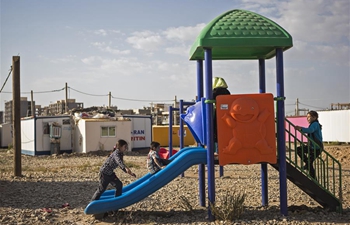ZHENGZHOU, Oct. 30 (Xinhua) -- Roaming around in the countryside of central China's Henan Province, one is surely to be greeted by slogans painted on village walls.
As the national crackdown on criminal gangs gained momentum, Ma Liubin, 68, began busily painting the walls in his village at the very beginning of this year.
Born in Dama County, Ma has been interested in Chinese calligraphy since his childhood and been painting slogans on walls for almost five decades.
"All of these are the courtyard walls of villagers. I always tell them before I come to paint slogans, and they are all supportive of my voluntary work," said Ma.
Villages often adopted the practice of painting slogans on walls to document milestone moments since the founding of the People's Republic of China in 1949, creating a unique cultural scenery in rural areas.
"The slogan is like a mirror reflecting the social mores and political language of the times. It is history on the walls. The villagers learn about the political climate at that time through the slogans," said Lang Junli, deputy party secretary of Henan's Weishi County.
HISTORY ON THE WALLS
Another slogan painter, 60-year-old Bu Xiansheng from Weishi, still remembers the day he painted the famous slogan that read, "Practice is the sole criterion for testing truth" in boldface.
In 1978, the slogan, which aimed to emancipate Chinese people's minds, ignited a nationwide debate, and later helped lay the ideological foundation for the country's reform and opening-up.
It was the last day of the summer harvest when Bu painted the sentence, "Keep your crop surplus after you fulfill state and local commune quotas" on walls in the late 1970s. A crowd of villagers craning their necks eagerly awaited behind him to see the slogan.
In the early 1980s, under the household contract responsibility system that replaced the collective labor and meal in People's Commune, the land was leased to farmers by contracts, and each household was required to return a proportional amount of grain to the government.
The most written-about slogans in Bu's memory, however, are those about the one-child policy, such as, "All couples should have one child only."
"We painted about family planning, a basic national policy, on the walls for over 30 years," said Liu Guozhan, 62, former curator of a local culture center in Weishi County.
By the early 1990s, a series of slogans that discourage gender discrimination towards newborn babies had been painted, which helped change the mindset of male preference in rural areas, according to Liu.
In recent years, catchphrases that advocate for tackling poverty also emerged, encouraging villagers to earn a well-off life through their hard work, instead of merely depending on government subsidies, said Bu.
NEW ERA OF ADVERTISEMENTS
Since the early 1990s, commercial advertisements from shopping centers, car dealers and insurance companies began showing up on walls as businesses flocked into the rural market.
"At the very beginning, commercial ads promoting household appliances including refrigerators, color televisions and washing machines were mainstream. Recently, there have been more and more ads for cars and houses, and especially for e-commerce sites like Taobao," said Ma.
Statistics show that the number of advertisements for agricultural products dropped dramatically from around three quarters in 2011 to no more than one tenth, while ads on automobiles saw a sharp increase from 3 percent to over 20 percent. E-commerce ads now account for over 40 percent.
Slogans are no longer the only thing one can see on village walls nowadays.
More paintings and poems that promote traditional Chinese culture and values are showing up in rural areas as well.
"As people's lives are getting better, the walls in the villages will become more beautiful," said Qi Baodong, a villager in Neixiang County, also in Henan.

















